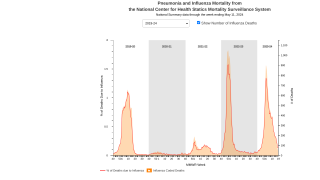Should People With MS Get a Flu Shot?

According to new guidelines developed by the American Academy of Neurology (AAN), people with Multiple Sclerosis (MS) can receive recommended vaccinations, including yearly flu shots.
The guideline published on September 24, 2019, updates the 2002 AAN guideline on immunization and multiple sclerosis.
The guideline recommends that people experiencing an MS flare consult their doctor before receiving vaccinations. They may want to consider waiting until the flare has passed before receiving vaccinations.
Currently, there is no cure for MS.
The new guideline published in Neurology, the medical journal of the AAN, is endorsed by the Consortium of Multiple Sclerosis Centers and by the Multiple Sclerosis Association of America.
“We reviewed all of the available evidence and for people with MS, preventing infections through vaccine use is a key part of medical care,” said guideline lead author Mauricio F. Farez, M.D., MPH, in an August 2019 press release.
“People with MS should feel safe and comfortable getting their recommended vaccinations.”
In addition, the guideline recommends that people with MS should make sure their doctor or care team knows what MS medications they are using before receiving vaccinations. There is some evidence that shows that certain vaccinations may not work as well with certain MS medications.
“After reviewing all the available evidence, we found that there is not enough information to say whether or not vaccinations trigger or worsen MS flares,” said Dr. Farez.
“Still, experts in MS urge their patients to hold off on scheduling their vaccinations if they are having an MS flare simply to avoid the potential for any complications.”
However, it is recommended that people work with their care team to maintain their regular recommended vaccinations, including the flu shot.
Major recommendations (Level B except where indicated):
- Clinicians should discuss the evidence regarding immunizations in MS with their patients and explore patients' opinions, preferences, and questions.
- Clinicians should recommend that patients with MS follow all local vaccine standards, unless there are specific contraindications and weigh local vaccine-preventable disease risks when counseling patients.
- Clinicians should recommend that patients with MS receive an influenza vaccination annually.
- Clinicians should counsel patients with MS about infection risks associated with specific immunosuppressive/immunomodulating (ISIM) medications and treatment-specific vaccination guidance according to prescribing information (PI) and vaccinate patients with MS as needed at least 4–6 weeks before initiating patients' ISIM therapy.
- Clinicians must screen for infections according to PI before initiating ISIM medications (Level A) and should treat patients testing positive for latent infections.
- In high-risk populations, clinicians must screen for latent infections before starting ISIM therapy even when not specifically mentioned in PI (Level A) and should consult specialists regarding treating patients who screen positive for latent infection.
- Clinicians should recommend against using live-attenuated vaccines in people with MS receiving ISIM therapies.
- Clinicians should delay vaccinating people with MS who are experiencing a relapse.
Multiple sclerosis is an autoimmune disease that can affect a person’s brain, optic nerves, and spinal cord. An unpredictable disease, MS can range from relatively benign to somewhat disabling, as communication between the brain and other parts of the body is disrupted, said the National Institutes of Health (8/2019).
In the case of MS, it is the nerve-insulating myelin that comes under assault. Such assaults may be linked to an unknown environmental trigger, perhaps a virus.
Several drugs have been approved by the U.S. Food and Drug Administration (FDA) to treat one or more forms of multiple sclerosis, either by decreasing attack frequency and severity, treating relapses, or delaying disease progression.
Some drugs are taken intravenously, some by infusion and some oral. All drugs should be prescribed and closely monitored by specially trained physicians, as some medications have serious side effects.
For more information, Multiple Sclerosis: Hope Through Research.
Learn more about multiple sclerosis at Brain and Life, home of the American Academy of Neurology’s free patient and caregiver magazine focused on the intersection of neurologic disease and brain health.
The American Academy of Neurology is the world's largest association of neurologists and neuroscience professionals. A neurologist is a doctor with specialized training in diagnosing, treating and managing disorders of the brain and nervous system, such as Alzheimer's disease, stroke, migraine, multiple sclerosis, concussion, Parkinson's disease, and epilepsy.
Multiple Sclerosis news published by Precision Vaccinations
Our Trust Standards: Medical Advisory Committee


























